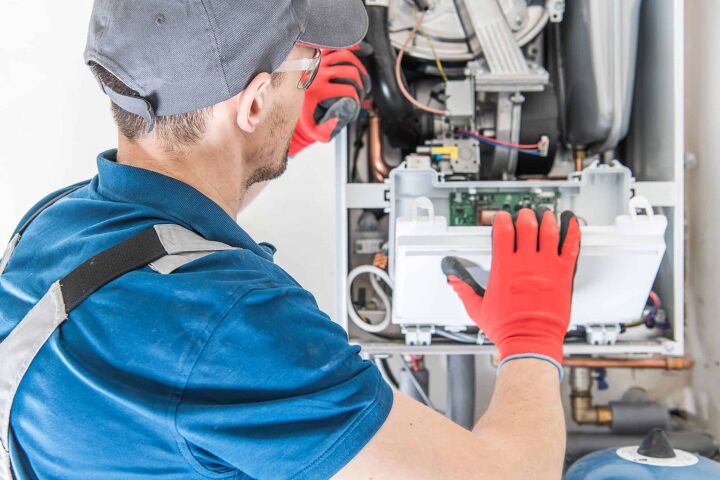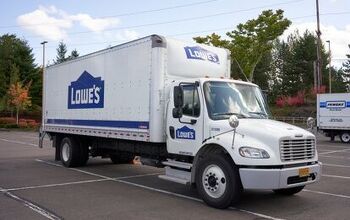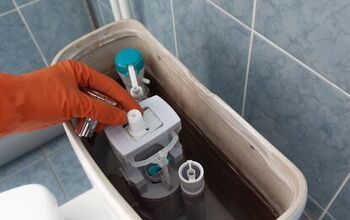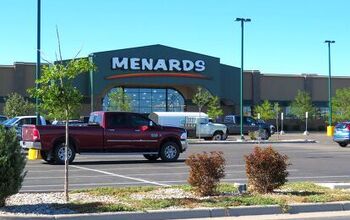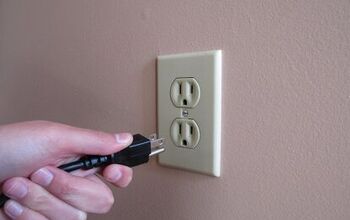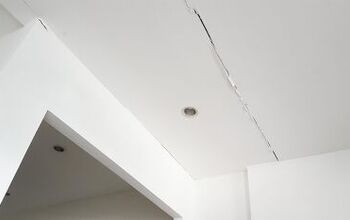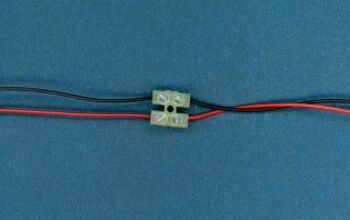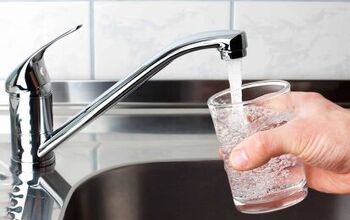Furnace Exhaust Smells Like Gas? (Here's What You Can Do)

Furnaces can generally come in both gas and electric. There is, however, the issue of a gas-like smell that occurs when running the furnace. Keep in mind that this will not be a problem for the electric varieties; this is a gas-only problem.
Your furnace may smell like gas if the furnace heat exchanger is damaged or broken. Furnaces also smell like gas if you haven’t run them in a long time at the start of a cold season. Contact a professional and leave your home if the gas smell persists and grows stronger.
Do You Need a Furnace Repair Contractor?
Get free, zero-commitment quotes from pro contractors near you.

Why Are You Smelling Gas?
Let’s make one thing perfectly clear: there is not a normal reason that you should smell gas coming from your furnace. If you smell gas and can be certain that it is coming from the furnace, it is a serious problem.
The very first thing to do is to make sure that it is indeed coming from the furnace. Far too many times, the smell of gas is coming from another appliance – generally the stove – which is somewhat normal, though it may require service on the appliance.
Furnace Heat Exchanger
When you’re certain that the furnace is the culprit, start by checking out the vents. Otherwise known as registers, this is what is responsible for transporting and distributing the heat throughout your home. If you can smell the gas coming through the vents, the most likely reason is due to the furnace heat exchanger.
If you are able to pinpoint the gas smell to the registers, turn off your furnace immediately and keep the windows open. The next move should be to call the gas company right away. A gas leak is a serious business, so if at all possible, stay somewhere else until the gas company arrives. You should also turn off the gas to your house as soon as you can to prevent a build-up of poisonous gas throughout your home.
Diagnosing the Issue
Get Out of the House
In the event that you can smell gas coming from the ventilation or you hear a noticeable hissing sound, you need to turn the gas off immediately and get out of the house. The first call should be to the gas company; the next call may need to be 9-1-1 depending on their response and whether or not anyone in your home is showing symptoms of carbon monoxide poisoning (more on that later).
It cannot be emphasized enough that if you smell gas, do not turn on any appliances, don’t light a lighter or match, and don’t even flip on a light switch. It is impossible to know how serious the problem is without professional intervention. If the gas build-up is major and any of those things creates a spark, it could be enough to ignite the entire house. This is why you need to get outside and away from the house immediately and call for help.
Both Propane and Natural Gas Furnaces Can Smell Like Gas
It only makes sense that having a unit that runs on some sort of gas would produce the gas smell. While there are other things that can go wrong with an electric furnace, this isn’t one of them. If you have an electric furnace and are still smelling gas, start with the stove first.
The main difference between natural gas and propane is their efficiency. Propane is capable of delivering far more BTUs (about 2,500 or so) of energy per cubic foot. Natural gas, meanwhile, is able to deliver less than half of that per cubic foot.
Both gases are also naturally odorless. Gas companies will add a chemical odor to them so that it is possible to detect gas leaks. You might not be familiar with the smell of propane or natural gas, but it is recognizable when you smell it: that rotten egg smell.
When the Smells Aren’t a Serious Thing
Keep in mind that it is okay to smell a faint gas smell without needing to be concerned. The most common cause is using the furnace for the first time in the winter. The gas smell is the result of dust being burnt up as the system gets back into use.
You may also smell a faint gas smell when the furnace kicks on. If it goes away, it’s probably not a big deal but might be worth getting checked out. Lastly, you might smell gas blowing back in the window. This is a good sign; it means the gas is being distributed out but the wind is kicking it back in.
Costs of Natural Gas and Propane
Even though safety is of the utmost importance in the presence of a gas leak, another major point of concern is the amount of money being wasted when a gas leak is present. One of the main reasons that people go with natural gas is due to the costs. It is substantially cheaper than either oil or propane, making it a top choice for millions.
| Fuel Type | Cost per MMBTU |
| Natural Gas | $19.62 |
| Fuel Oil | $34.60 |
| Kerosene | $38.84 |
| Propane | $41.87 |
A good rule of thumb is that natural gas will be about half the price of propane in most areas, but there are some places where it can be up to six times cheaper. So, despite the greater output capabilities of propane, natural gas tends to be the go-to option.
Do You Need a Furnace Repair Contractor?
Get free, zero-commitment quotes from pro contractors near you.

Why a Gas Leak is Dangerous
Gas leaks are nothing to mess around with. They are extremely dangerous and should be treated with the respect that a situation like this deserves. A gas leak can be deadly in nature and requires professional intervention to correct.
Carbon Monoxide
Gas is naturally combustible, which is bad enough. But gas can also emit carbon monoxide. If you don’t know how dangerous carbon monoxide is, it has earned the nickname “the silent killer.” This is because carbon monoxide is completely odorless and quite easily absorbed into the lungs, more so than oxygen.
If given enough time to build up, carbon monoxide can asphyxiate you because your blood will become saturated with carbon monoxide instead of the oxygen that the body needs to survive. There’s a chance you may notice the symptoms before it is too late: a throbbing headache and drowsiness, though it is easy to just dismiss those as separate symptoms that have nothing to do with being poisoned.
Fire Risks
If it weren’t bad enough that you could slowly asphyxiate over time, there is another major risk of a gas leak in your home: the increased risk of fire and explosion. For propane, it is denser than the air, sinking to the floor and collecting in large enough quantities to risk an explosion. Natural gas, meanwhile, is actually lighter than air so it will disperse into the air unless the ventilation isn’t good enough. So, when the natural gas builds up in the air, it not only increases the risk of fire, but potential explosion as well.
Because of these two very serious health and safety risks, gas companies began adding the rotten egg smell. This allows homeowners to detect leaks before they have a chance to build up into something major and potentially deadly.
Related Guides

Ryan Womeldorf has more than a decade of experience writing. He loves to blog about construction, plumbing, and other home topics. Ryan also loves hockey and a lifelong Buffalo sports fan.
More by Ryan Womeldorf



